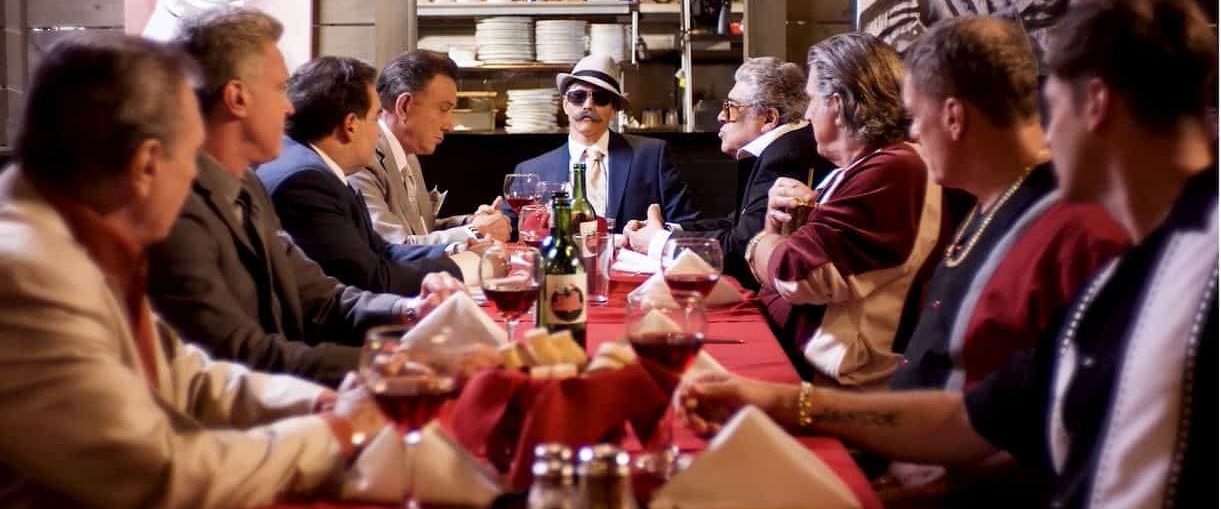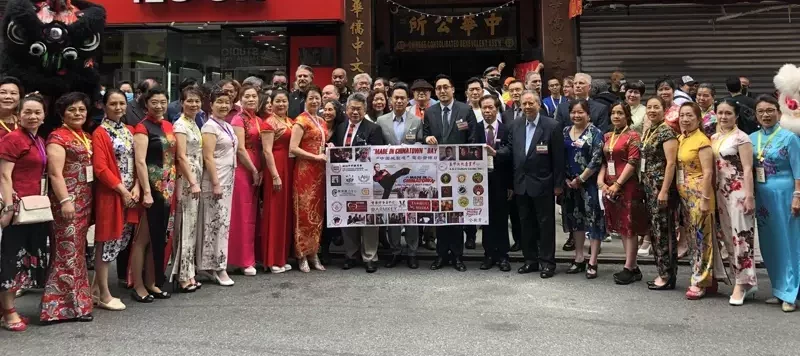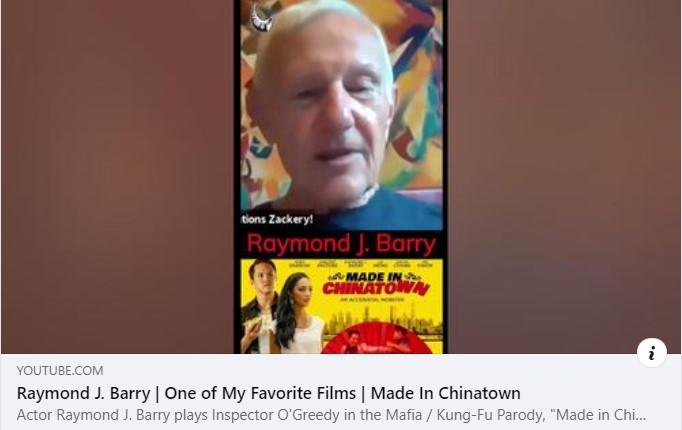by Li bei
In order to become a wiseguy and win the love of his dream lover, the young Chinese guy who grew up in Chinatown decided to join the Italian “gangster”. Will he be accepted or rejected? Chinese girl or Italian beauty, which one did he choose? Once lost in Chinatown, can he finally find himself? All the answers are in this movie “Made in Chinatown”, which was filmed in Philadelphia’s Chinatown, which combines gangsters, kung fu, and comedy elements. The film’s producer and screenwriter, Mark V. Wiley, who jokingly called himself an “egg man” (egg man), had something to say.
The following interview with Mark Wiley was conducted by “Haihua Metropolis Daily” reporter Li Bei, an published in the June 09, 2021 edition of Metro Chinese Weekly newspaper. It is translated here from its original Chinese.
Reporter: I am very glad that you can accept our interview. As a producer and screenwriter, can you tell everyone what kind of story “Made in Chinatown” tells?
Mark Wiley: The movie Made in Chinatown tells the story of New York’s Chinatown and Little Italy. Vinny Chow, a young Chinese guy living in Chinatown, decided to “cross-border” and join the Italian “mafia” in order to gain the favor of the lover of his dreams and become the “wise guy” of his dreams. He fell between the two cultures of China and Italy, and even more unknowingly fell into two loves, a series of interesting stories unfolded.
In New York, Chinatown and Little Italy face each other, and the “meeting” of the two is comically treated in Made in Chinatown. This is not a spoof of the experience of Asian immigrants, without the label of racial stereotypes, but the film is an experience and display of the lives of different cultures and different ethnic groups. On the surface, Made in Chinatown is an action comedy that audiences love to see, and familiar Italian gangster movies and Kung Fu movies can also be found in the film. But the core of the film is about the process of a second generation of Asian Americans trying to find love, respect and integration, a process of self-discovery.

Reporter: When I watched this movie, I was really amused by a lot of plots. It was very happy and relaxed. At the same time, I also think this is a very sentimental movie that can resonate with many people, especially Chinese audiences. I want to know, where did the original idea for this movie come from?
Wiley: Twenty years ago, I was in Chinatown in New York. At that time I wanted to join a club to learn martial arts, but I was turned away. They said that only Chinese can participate, but I can’t. Across a street, I came to “Little Italy” across from Chinatown. While eating lunch, I wondered: I can’t join a Chinese organization. If the other way round, suppose a Chinese wants to come to Little Italy and join the Italian Mafia, what will happen? why not? My thoughts at the time were a bit naive and ridiculous, after all, I was only 30 years old. Made in Chinatown came from this idea.
Reporter: Maybe when many people saw the title of “Made in Chinatown”, including me, everyone’s first reaction was that it was a work by a Chinese director. But this is not the case. The original producer and screenwriter of the film was a “foreigner”. So I am curious, why do you want to make such a movie?
Wiley: I am from Philadelphia. My ancestors came from England, Ireland and Italy. They immigrated to the United States more than 200 years ago. Although I have no Asian ancestry, I have a lot of affinity with Asian culture and Chinese culture. I remember when I was very young, I saw a book of “I Ching” on my mother’s bookshelf. My father is a doctor, and he also has a book about acupuncture. When I was young, I also liked watching Hong Kong Kung Fu movies on weekends
When I was 9 years old, I was always bullied by bad kids. Moreover, I was still a premature baby, chronic pain and migraines have been with me. My mother wants me to practice martial arts because she wants me to strengthen my body and protect myself through martial arts. My father is a doctor. He treated me with Western medicine. He also introduced me to chiropractic. He also tried Qigong and acupuncture to help me. So when I was in my 20s, I saved some money and started traveling in Asia, looking for ways to treat headaches and gain health.
You may not think that I have been to Asia more than 20 times, and I have traveled to the Philippines, Malaysia, Singapore, Japan, Hong Kong and other places. Along the way, I learned more about martial arts, Tuina, Qigong, Gua Sha, acupuncture and moxibustion. I also met many masters. All this has reduced my pain a lot, and it has also made me a better version of myself. It’s amazing. I don’t know why I’m so obsessed with Asian culture. Maybe it’s because I was Asian all my life.

Reporter: The movie “Made in Chinatown” tells an interesting story. I want to know as a screenwriter, how did you structure this story? Are many of the plots your own experience?
Wiley: I have published many books on martial arts and Chinese medicine before, but I like storytelling very much, so I started to write. Later, I felt that instead of letting everyone read this story, it would be better for everyone to read this story, so there was the movie Made in Chinatown.
Every character in the film has my own shadow. I have Italian descent, I am interested in Asian culture, I practice martial arts, and I also read many books on Asian philosophy. You can find these things in the film. Including myself, I don’t know how to fall in love in real life. The guy in the film also encountered the same problem: there is a good girl who loves him deeply, but he “turns a blind eye”, and instead pursues the lover of his dreams, even at any cost. To change yourself. Later, he came back after a long lap, and I also had this experience.
You can also find some interesting details in the movie, such as the main character in the movie. He is the second generation of Chinese immigrants. He grew up in American culture and does not even speak Chinese. This special group is called “bananas”. People” (meaning Chinese people born in the United States, although they are also black-haired and yellow-skinned, but they do not know Chinese and speak authentic American English). This detail is shown in the film, and you will see a lot of banana patterns on the clothes worn by a porter. We want to express this meaning in a relaxed way.
There is another detail. After the Chinese young man dealt with “Little Italy”, his mother said when he saw him, “Why is your Chinese accent gone?” The young man said, “Mom, I don’t have an accent. I grew up in New York. Yes.” His father said, “Maybe it’s because you ate too much spaghetti.” Can eating pasta change your accent? of course not. In fact, what his mother said was not an accent. What her son was losing was the Chinese tradition and culture. Many people laugh when they see this plot. It touches a very serious topic in a relaxed way.

Reporter: In the film, fans will find many familiar faces, such as Hong Kong martial arts actor Lo Meng, who has performed well in many Hong Kong Kung Fu movies; and the famous movie “Good Guy” Actors Tony Darrow (Tony Darrow), old drama bones Vincent Pastore (Vincent Pastore), etc., these gangsters can make movies with Chinese Kung Fu stars, it is very incredible. As a producer, how did you organize this cross-cultural team together?
Wiley: I like watching “The Godfather” and other movies that describe Italian gangsters, so I am also very happy to have “big names” who have appeared in gangster movies to join in, and kung fu film masters from Hong Kong can join in. In particular, the addition of Lo Mang has increased the highlights of the movie “Made in Chinatown”, and their fans will not be disappointed.
It is worth mentioning that the actor of the actor Vinny Chow, you may not think that he is not of Chinese descent, but of Korean descent . I find it more interesting to have a “Korean” play a “Chinese” who likes Italian culture. We found Jay Kwon on social media and thought he was very suitable for this role. Jay Kwon is from Los Angeles and was adopted by a white family from a young age, so he has neither Chinese nor Korean cultural background. Although he can’t fully understand what I want to express, he works very hard to understand and try, and in the film, his kung fu is true. As his first movie role, he acted very well.
I would also like to boast that the two directors of “Made in Chinatown”, director Bobby Samuels and I are both from Philadelphia. When I was practicing martial arts in Asia, he learned how to make action movies in Hong Kong. Another director, James Lew, and I have also been friends for decades. A few years ago, he won an Emmy Award for “Marvel’s Luke Cage.” We cooperate very well.
Although this film tells the story of New York’s Chinatown, most of the shots were shot in Philadelphia’s Chinatown. You will find many familiar scenes, which are the daily life in Philadelphia’s Chinatown. We have been shooting in Chinatown for more than 20 days, and we have received help from many Chinese people, which makes me very touched. In fact, I also played a small role in the film, a stall owner selling hot dogs, interested friends can come to me.
Reporter: As you said just now, this movie is an action comedy, very good-looking. At the same time, it is also discussing a cross-racial and cross-cultural reality topic. What kind of views do you want to express through the film?
Wiley: Just like the male protagonist in the film, he gave up the “vanity” dream lover, and finally chose the girl who truly loved him. At the end of the film, he also returned to his own ethnic group and culture and found himself . In the United States, no matter what race or skin color you are from, you have the right to do what you like, but you cannot change your race or your original culture or forget your roots. At the same time, I think everyone should “go out”. They can marry across races, make friends, or try different food, language, music, education and literature. These are no problems, because these will help you understand better others.
Although we have different races and skin colors, we belong to the same big family. But unfortunately, the racial problem in the United States has become increasingly serious in recent years. Last year’s “Hei Minggui” and this year’s anti-Asian hatred movement both illustrate the seriousness of this problem. I think we should integrate and understand more different cultures. Everyone and every culture should be respected. This is also one of my original intentions when shooting “Made in Chinatown”.
Reporter: Do you have any new plans next?
Wiley: My next film is in preparation. You will see a dangerous murder in Chinatown. I’m still preparing to make a TV series about a fortune teller from China helping the police solve the case. At this stage, I still have a very important job, which is to recommend this movie to everyone.
On June 12th, we will have an official “Made in Chinatown Movie Day” in New York’s Chinatown. The main creators and the media will participate, and there will be dragon dance performances to help. I hope that in the near future, such an event can be held in Philadelphia’s Chinatown. Because this is a movie that tells the story of Chinatown, I hope that more Chinese friends can see this movie. This is my biggest wish.
Reporter: Thank you for accepting our interview. I also wish the sentimental and beautiful film “Made in Chinatown” can get more audience attention. I also wish you a smooth filming of your next work and see you soon.
AVAILABEL TO WATCH ON
AMAZON – FREEVEE – TUBI – APPLE TV – GOOGLE PLAY – XFINITY…
Check your listings!






